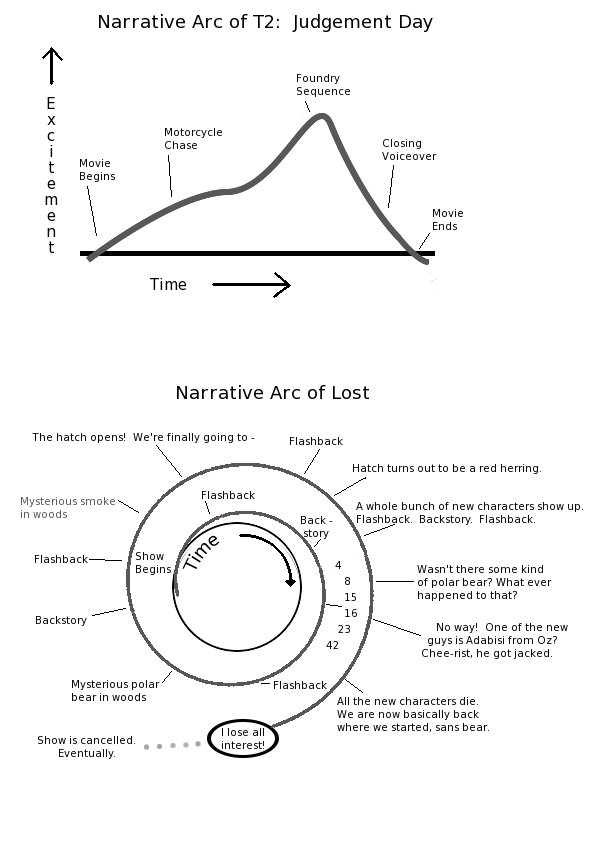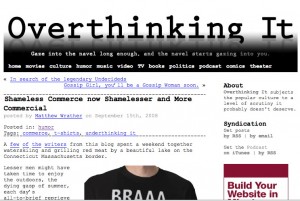Never again will the real have the chance to produce itself — such is the vital function of the model in a system of death, or rather of anticipated resurrection, that no longer even gives the event of death a chance.
–Jean Baudrillard
Let’s play a game: I’m going to say something ridiculous, just for the fun of it. Okay, here goes. “The Terminator franchise will come to an end with the upcoming Christian Bale movie, Terminator: Salvation. It will be the very last Terminator story ever told in any medium; the franchise will die when the credits roll.”
So why is that so absurd? Obviously a franchise is endlessly renewable as long as a corporate entity believes the property has value, and yet franchises do die. There is nothing inherently ridiculous about the claim that there will not be another Ghostbusters movie. The two that already exist present us with closed narrative forms, both individually and as a unit. If another Ghostbusters movie were to be created, it would be a resurrection of a dead property. The same is not true of the Terminator, which, as of the Sarah Connor Chronicles, exists outside of time.
The End of History
In the Terminator movies, the end of history was rather explicitly pegged to a robot uprising, scheduled to take place on August 29, 1997. The world of the films is guided by a master narrative in which the plucky human resistance rises up and overthrows their robot overlords. The robot side has its goals too: to destroy John Connor and the resistance once and for all. (Say what you will about the tenets of the T-1000, Donny, at least it’s an ethos.) Now, the films may go back and forth on the issue of which narrative is likely to prevail. At the end of T1, the apocalypse is still approaching on schedule, but humanity’s eventual salvation under the leadership of JC is assured. At the end of T2, apocalypse has been averted, and humanity can proceed directly to a robot-free utopian existence.  T3 (rather uncanonical these days) allows the robots to win, nuking the crap out of most of humanity. This is a downer, but the events still make some kind of teleological sense. One could conceive of an infinite series of Terminator movies, each of which reverses the outcome of the final struggle, but the struggle in each case would still be final. At the end of each movie, Judgement Day will have been prevented (or not). John Connor will have survived to go on to lead the resistance to victory (or not). The humans will win, or the robots will…
T3 (rather uncanonical these days) allows the robots to win, nuking the crap out of most of humanity. This is a downer, but the events still make some kind of teleological sense. One could conceive of an infinite series of Terminator movies, each of which reverses the outcome of the final struggle, but the struggle in each case would still be final. At the end of each movie, Judgement Day will have been prevented (or not). John Connor will have survived to go on to lead the resistance to victory (or not). The humans will win, or the robots will…
Or Not.
With the Sarah Connor Chronicles, the notion of a final victory for the humans or for Skynet, becomes untenable. Some of this has to do with a change to the time-travel physics of the show. In the movies, Skynet sends robots back in time to kill the Connors. It does that in the TV show too, but this season it began to send robots back for the specific purpose of creating Skynet. If this kind of bootstrapping is allowed, nothing that happens in the narrative can have any kind of permanent or objective truth. The war against the robots is now both preemptive and permanent, not unlike Whack-a-Mole® or the War on Terror™. The “end of history” presented in the movies is apocalyptic: Judgement Day is a consumation devoutly to be wished, or at worst a catastrophe to be avoided. The series presents us with a world in which history – the idea of history – has already ended. Not with a bang, not with a whimper, not with anything. It’s just not relevant any more. And as we bid farewell to history, so too we bid farewell to narrative causality. Now, this sounds like a serious diss on the show, but really it’s not. Narrative causality can’t be sustained in a TV series anyway. Yes I’m overstating my case for rhetorical effect. Bear with me.
We expect certain things of narrative. Well, we expect all kinds of things, but for my purposes today, we expect that:
- With a few exceptions, all events in the story will contribute to the narrative.
- The story will have a beginning, a middle, and (crucially) an end.
- Causes early in the story will lead to effects late in the story. (Character development is a subset of this)
- The characters will have goals which they will accomplish, or fail to accomplish, at the climax of the narrative.
- The narrative will end shortly after the climax.
Are there narratives that violate these laws? Of course. But they aren’t normal. Deviation from the model implies a conscious choice to buck the system, and instructs us to adjust our expectations accordingly. Many movies have prominent events without narrative justification (badass flying kicks, awkward sex scenes, pie-in-the-face gags), but we explain these away by activating the generic expectations associated with kung-fu movies, Skinemax, and slapstick comedy. Kafka’s The Castle has a beginning, middle, and no end: we explain this away by activating the generic expectations associated with the fragmentary work (and thus investing it with all sorts of romantic associations). If a movie has effectless causes and causeless effects, we see it as either artsy (c.f. No Country For Old Men) or incompetent (c.f. Black Dog). But when these rules are broken in a long-running television serial, we don’t have to explain anything away, because the rules are different on the small screen.
- Most events are motivated by the local plot of the episode; events are assumed to have no large-scale narrative significance unless we have reason to suspect otherwise.
- The story has a beginning and a constantly expanding middle, but (ideally) no end.
- Causes early in the story may or may not have any effect later in the story; at least some will be discarded.
- The characters have goals which can never be accomplished OR definitively quashed.
- The serial will end shortly after the public loses interest or (in rare cases) it becomes too expensive to produce.
Number five is the key point. The end of a narrative is motivated by story-logic: we assume that the writer (or director, or what have you) placed it where they did because it was artistically satisfying. The end of a serial is motivated by finance-logic: we assume that the network placed it where they did because the show was no longer making money. Since serials are narratives of a kind, they can’t just up and end (well, they not usually), so a climax has to be inserted.
The terminology here is a little confusing. Often when we say climax, we mean the emotional climax, which is simply the most exciting point in the story for any given spectator. I want to talk about the narrative climax, the moment in which the characters accomplish (or fail to accomplish) their goals, separating the rising and falling actions, and signaling the end of the narrative. In most narratives, the emotional and narrative climaxes are synchronized. But in a TV series, however well-made, the climax will not occur until the series has become unprofitable, which means that almost by definition the emotional climax will already have passed for most of the viewers. Scrubs is a perfect example of this: in 2006, the show was set to be cancelled. I’m something of an anomaly in that I do still care about Scrubs (well, I did in 2006) so for me, the emotional and narrative climaxes were pretty well lined up. JD was having a baby, Eliot was going to get married, Kelso was retiring… I was all set to be impressed by how well they had managed to tie everything up. And then the show got picked up for another year. And then another. The result: plotlines, stretched like the cables on a suspension bridge, snapped, backlashing wildly and tearing huge rents in the fabric of my ability to give a rat’s ass about Scrubs.
Obviously this is nothing new. Soap operas have been playing this balancing act for decades, as have comic books. But after a certain point, they don’t pretend to be subject to the laws of narrative. This isn’t necessarily a criticism. Rather than criticizing these shows for what they aren’t, we should enjoy them for what they are (as fans of soaps and comic books generally do). The serial has major advantages over the well-made narrative in its ability to depict characters and richly textured worlds. The characters can’t develop too much – the non-historical timeline of the serial prevents this – but entire episodes can be devoted to exploring a certain aspect of their personality or background. The serial’s fictional world can’t really change much either, but it can be examined and explored in loving detail. The Connor Chronicles has been making the most of these strengths. The movie version of Sarah Connor, for all that she’s a badass, is pretty one-note: in the first, she desperately wants not to get killed by Ahnold, in the second, she desperately wants to protect her son. There’s a lot of the T2 Sarah Connor in the TV version, but her character is FAR more nuanced. For the first time, you get the sense that she regrets the normal life she has had to give up. Her relationship to John is also much more complicated: she’s got the whole avenging-maternal-angel thing going on, sure, but there’s also a little percolating resentment going on, and even a whiff of Oedipal conflict. (There’s no erotic tension between them as such, thank god, but she clearly dislikes any girl that her son takes a romantic interest in, and only partially because outside relationships put John’s survival at risk.) This is also the first Terminator I’ve seen in which John Connor wasn’t a total cypher. And we’re getting all kinds of interesting exposition of the apocalyptic future that the Connors are working so hard to prevent.
In an earlier Terminator-themed podcast, I referred to the show as skillfully executed fanfic. I realize now that this wasn’t quite fair. The show is created by a team of professionals who take pride in their roles as custodians of the Terminator canon (as proven by our Bear McCreary podcast, here). Nevertheless, there are similarities. Fanfic, like the Connor Chronicles, dispenses with the notion of narrative causality. (For every ‘fic that fills in a scene that did occur “off camera” in the original narrative, there’s a dozen in which, well, you know, Harry Potter impregnates Draco Malfoy.) Fanfic, like any serial, is more about character and setting than it is about plot. (Oh, plot may well be the thing that separates the good fanfic from the bad, but people don’t read fanfic unless they are fans of the source text, and while the plot of the source is discarded, its setting and/or characters are maintained.)
But there’s a major difference between fan fiction and the Connor Chronicles, and I don’t mean the lack of hot hot Schwarzenegger-on-Biehn action. Fanfic is an imitation – or in some cases a perversion – of the “real” text, and always distinct from it. The Connor Chronicles, on the other hand, is an imitation of the real text which is itself the real text. If I was looking to name-drop Baudrillard again – and heck, why wouldn’t I? – I’d call it a simulacrum.
A “simulacrum” is basically a false thing that gives every outward appearance of being a true thing, which makes it a good term for canonical works that share the characteristics of fanfic. In recent years, we’ve had “Robert Ludlum’s The Bourne Sanction, a new Jason Bourne Novel by Eric Van Lustbader,” Indiana Jones and the Kingdom of the Crystal Skull, and Star Wars Episode I. The first one basically hangs a lampshade on it, but the second two are less obvious. What stops them from just being sequels? Well, Lucas jumped through hoops to insert R2D2 and C3PO into Episode I, just for the sake of giving some beloved characters another lap around the track, and that sounds like fanfic to me. As for the Crystal Skull, Mutt Williams is a pretty ridiculous Mary Sue. Actually, one could argue that ALL the Indiana Jones movies are simulacra, since Spielberg intended them to be an homage to the beloved adventure movies of his youth, and they became the beloved adventure movies of everyone else’s youth.
But please keep in mind that I’m not making any categorical judgements about the quality of the latter-day Bourne book (which I haven’t read), or the Indiana Jones sequel (which I generally liked) or the Star Wars prequel (which I hated). I’m just trying to point out a new trend in the American entertainment industry. Anyway, that’s my take on what is going on. Now let’s talk about why.
It’s the Economy, Stupid
Profit motivates basically everything, especially when you’re talking about something as fundamentally expensive as a movie or a TV show. Well-made narratives like the original Indiana Jones were made in the first place because people like them and are willing to pay for them. But although the taste for narrative causality used to be universal and absolute, it has been fading in recent years. I mean, apparently, right? Why might this be? Here we can only speculate. Some would claim that it has something to do with our increasing reliance on the internet, the least narrative medium of all. To Baudrillard, it would probably have to do with society’s increasing distrust of the grand social narratives that sustained us through the Cold War. We no longer live in expectation of some future bliss: we live both in and for the ever-intensified present. I have a different theory.
Because our taste for narrative definitely isn’t gone yet. I don’t even think it’s fading: I think we’re addicted to it, and like any addict, we don’t know how much of it we can handle. Modern America demands a story arc both neverending and well-made, allowing for infinite exploration of world and character (and preventing separation fan-xiety), but also allowing for change, real stakes, points of crisis, rising and falling action, closure, and so on. Of course this is impossible. But our paradoxical desire explains shows like Lost, which desperately wants to have a narrative arc, but ends up in an ever-spiraling narrative orbit. (Click the pic for a readable chart.)
 One last point. You’ll notice that the beginning of the Lost chart looks pretty much the same as the beginning of the T2 graph. This means that the time to start watching the Connor Chronicles is NOW. It’s still on the narrow part of the spiral. It will probably spin out of control: most of these shows do. But right now it’s good, and getting better.
One last point. You’ll notice that the beginning of the Lost chart looks pretty much the same as the beginning of the T2 graph. This means that the time to start watching the Connor Chronicles is NOW. It’s still on the narrow part of the spiral. It will probably spin out of control: most of these shows do. But right now it’s good, and getting better.


Tell Francis Fukuyama to eat his mutha effing heart out.
Not to be too nit-picky, but… I’d like more explanation as to why the upcoming film will end the franchise: you barely spoke about it, even though it and not the _Connor Chronicles_ is what is supposedly going to end the franchise.
*OR*, did you say that about the movie to try to prove that no, it won’t, because the series exists and thus cancels out the potential end of history the movie could bring? In other words, was the whole piece an attempt at dis-proving the thesis that the movie will end it? If that’s the case, please do some “thus”-type stuff for me so I get it more. I understand what you’re saying about the series, but I can’t tell if you really think the Terminator universe is ending or ever will end.
And which is more canonical, the new movie or the series?
And I just have to bring this up because I’m a nerdy fangirl and stuff. The Batman universe has had myriad different incarnations. The comics themselves have variances that could be considered separate entities, and then there are the multiple TV series (counting the animated ones), the older set of movies, and the newer Nolan films. I’d speculate that it gets away with this because of its literary (if comics can be considered litarature, which for my purposes, yes, they can) origins. Every interpretation of Batman after the original is in some way fanfic. But now my question is this: could Terminator have the same life as Batman, even though it started out as a movie? Or is it bound to what we have now, and that’s it?
I’d like to argue no. Lots of things started in digital/film-type forms have cult followings that have sprung all sorts of other bits to them. “Firefly” has a movie, role-playing game, comic series, action figures, books- and it was originally a show which (depressingly) didn’t last an entire season. Since not all of the spinoff stuff came from Joss Whedon, does that mean it doesn’t count as part of the “Firefly” universe, even though all fit within what Joss did quite nicely? Is the movie the only thing not fanfic? No, I believe that so long as it doesn’t disrupt the flow of the original, it can still count within the universe- it’s when the fanfic starts making up its own rules that it should be excluded. It can still be fanfic, but it doesn’t have to be extrapolated from the universe it is attempting to take from. I mean, as depressing as it may be for some, the newest Indiana Jones movie did play out like bad fanfic, but it doesn’t screw up what we already knew about Jones or anyone else.
Now, I recognize there is a flaw in my argument: every different interpretation of Batman eventually reached an end (except Nolan’s, which is still ongoing, but it will inevitably end, too). But I think each one has its own version of “canon” and the original comics are like the platform or foundation for them, making them all part of the same universe. As one history ends, another begins.
Thank you, Stokes, for writing this post. I was about to write something about how time works in the Sarah Connor Chronicles (as opposed to the Terminator movies) but my brain exploded in the process.
I’m mostly just curious to see if Terminator: Salvation follows the timeline of T3, the timeline of T2 (or even T1?), the timeline of SCC, or none of the above.
And god help any poor souls who decide to actually write Terminator fanfic…
Sunt geminae Somni portae, quarum altera fertur
cornea, qua ueris facilis datur exitus umbris,
altera candenti perfecta nitens elephanto,
sed falsa ad caelum mittunt insomnia Manes.
his ibi tum natum Anchises unaque Sibyllam
prosequitur dictis portaque emittit eburna,
ille uiam secat ad nauis sociosque reuisit.
– Vergil, _Aeneid_, Book VI
So who’s leading us through a portal or gate of false dreams, fenzel?
(Classics… heart… If only I could have endured through Latin in college…)
My head, it asploeded.
Re: Sarah Connor Chronicles being in the narrow part of the spiral, I unfortunately agree with you, Stokes. There are way. too. damn. many. terminators that keep popping up in the story line, which means way. too. much. time travel going on. And if time travel has turned out to be so easy for SkyNet to do after all, why didn’t they just send, like, 5 terminators back to 1980 to kill Sarah Connor when she was a teenager, or back to 1960 to kill her grandmother?
One of the assumptions that Terminators 1, 2, and 3 all rested upon was that time travel is not a trivial thing. Remember Sarah’s opening monologue from T2?
“As before, the Resistance was able to send a lone warrior.”
This assumption has clearly been ripped to shreds with the new TV series.
Sigh. My head is still asploeding.
He’s the one saying:
“Si vis vivere, vale mecum.”
I mean, I’ve never watched the show, but have the robots ever tried to, like, send back hordes upon hordes of ebola-infected monkeys?
Anchises? I must not be overthinking this enough…
Gab: my point was that the up upcoming movie won’t – and can’t – end the franchise. For the various reasons I mentioned in the post, I don’t think the franchise ever can “end,” exactly. It can certainly STOP, and eventually it will. But at this point no audience is going to accept the ending as how the story REALLY ends… it’s just going to be how they tried to wrap things up when they ran out of time.
I like your notion of there being a separate Bat-canon for each Bat-author.
As for what counts as canon in general: for the most part, people treat anything produced by the copyright holders as canonical. There are exceptions, but they’re few and far between. The idea that anything that contradicts an older – and thus, presumably purer – source can be excluded is certainly nice, but it hardly ever happens. Instead, people find ways to reconcile even the most glaring contradictions. By the same token, something that ISN’T produced by the copyright holders has a snowball’s chance in hell of becoming canonical, no matter how well it lines up with what we already know about the character/world/etc.
Oddly(?) enough, the one place I can think of where your method of determining canonicity WAS applied was the Council of Nicea.
Fenzel: And also saying “Non tumoris est.”
“By the same token, something that ISN’T produced by the copyright holders has a snowball’s chance in hell of becoming canonical, no matter how well it lines up with what we already know about the character/world/etc.”
Tell that to the Catholic church. Ba-ZING!
Oh, PS, there have definitely been some fanfic communities that are so powerful that what they say in their fics becomes almost canonical. In other words, people who read a lot of fanfic start to read a character in a certain way and then write more fanfic using those character traits. Then when they or their readers go back to the original source, they interpret the character according to the fanfiction canon (aka Fanon: http://tvtropes.org/pmwiki/pmwiki.php/Main/Fanon).